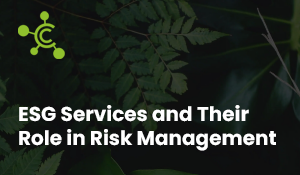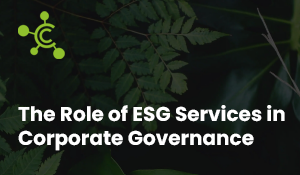Introduction
Risk management is a critical aspect of any successful business strategy, and in today’s world, ESG (Environmental, Social, and Governance) factors are increasingly recognized as significant sources of risk. ESG services have emerged as essential tools for identifying, assessing, and managing these risks. This post explores how ESG services contribute to effective risk management and why they are crucial for businesses operating in a complex, interconnected world.
Understanding ESG-Related Risks
ESG-related risks are those that arise from a company’s environmental, social, and governance practices. These risks can have significant financial, operational, and reputational impacts on a business. Common ESG-related risks include:
- Environmental Risks: These include risks related to climate change, resource depletion, pollution, and biodiversity loss. Companies that fail to manage their environmental impact may face regulatory penalties, increased costs, and damage to their reputation.
- Social Risks: Social risks stem from a company’s interactions with its employees, customers, suppliers, and the broader community. These can include labour disputes, human rights violations, and issues related to diversity and inclusion. Poor social practices can lead to legal challenges, boycotts, and loss of customer trust.
- Governance Risks: Governance risks are associated with how a company is managed and controlled. This includes risks related to executive compensation, board structure, ethical breaches, and compliance with laws and regulations. Weak governance can lead to fraud, scandals, and loss of investor confidence.
How ESG Services Support Risk Management
ESG services provide the tools and expertise needed to identify and mitigate ESG-related risks. Here’s how they contribute to effective risk management:
- Risk Identification: ESG services help companies identify potential risks related to their environmental, social, and governance practices. This includes conducting risk assessments, scenario analysis, and stakeholder mapping to understand where the greatest risks lie.
- Risk Assessment: Once risks are identified, ESG services assist in assessing the likelihood and potential impact of these risks. This involves analysing data, trends, and external factors to determine how ESG-related risks could affect the business.
- Risk Mitigation: ESG services provide strategies and solutions to mitigate identified risks. This could include developing sustainability initiatives, improving labour practices, enhancing governance structures, and increasing transparency.
- Monitoring and Reporting: ESG services support ongoing monitoring of ESG risks and provide regular reporting to stakeholders. This ensures that companies stay informed about emerging risks and can take proactive steps to address them.
- Regulatory Compliance: ESG services help companies navigate complex regulatory environments, ensuring that they comply with ESG-related laws and regulations. This reduces the risk of legal penalties and reputational damage.
The Business Case for ESG Risk Management
Effective ESG risk management is not just about avoiding negative outcomes; it also presents opportunities for businesses to gain a competitive advantage. Here’s why ESG risk management is essential:
- Protecting Reputation: Companies that manage ESG risks effectively are less likely to experience scandals, boycotts, or negative publicity. This protects their reputation and builds trust with stakeholders.
- Attracting Investors: Investors are increasingly prioritizing companies with strong ESG risk management practices. Effective ESG risk management can improve a company’s ESG ratings, making it more attractive to investors.
- Enhancing Resilience: ESG risk management helps companies build resilience to external shocks, such as regulatory changes, market shifts, and climate-related events. This ensures long-term stability and success.
- Driving Innovation: Addressing ESG risks often requires innovative solutions, such as developing new products, improving processes, or adopting new technologies. This can lead to increased efficiency, cost savings, and new revenue streams.
Case Studies
Several companies have successfully used ESG services to manage risks:
- BP: After the Deepwater Horizon oil spill, BP recognized the need for stronger ESG risk management. The company has since invested heavily in ESG services to improve its environmental practices, enhance governance, and rebuild its reputation.
- Nike: Nike faced significant social risks related to labour practices in its supply chain. By leveraging ESG services, the company has improved its labour standards, increased transparency, and restored its reputation as a responsible global brand.
- Nestlé: Nestlé has used ESG services to manage risks related to water usage, deforestation, and human rights in its supply chain. The company’s proactive approach to ESG risk management has helped it maintain its position as a leader in sustainability.
Conclusion
ESG services are essential tools for effective risk management in today’s complex business environment. By identifying, assessing, and mitigating ESG-related risks, companies can protect their reputation, attract investors, enhance resilience, and drive innovation. As ESG factors continue to play a growing role in business success, companies that prioritize ESG risk management will be better positioned to thrive in the long term.




